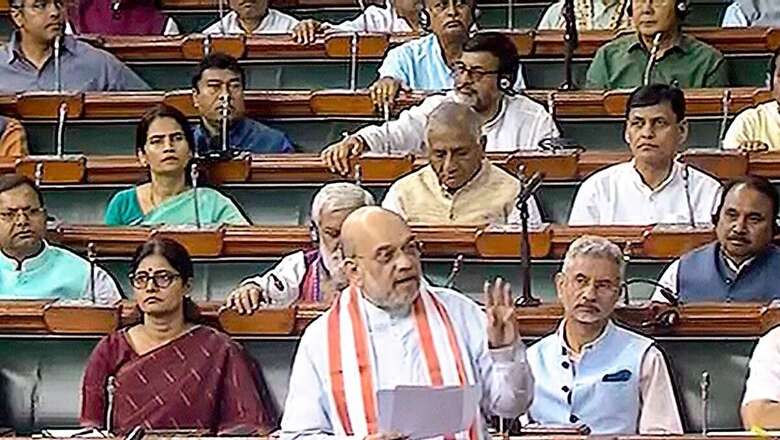
views
The Central government, on the last day of the monsoon session on Friday, introduced three important bills – replacing the Indian Penal Code (IPC), Criminal Procedure Code (CrPC) and Evidence Act — which will change the architecture of the crime and punishment system. The bills, which will now be referred to a select committee, will take a while to come into effect.
The change, introduced by Union Home Minister Amit Shah, repeals Sedition 124A of the IPC. During his address, the minister said, “Everybody has the right to speak, so we are repealing sedition completely.”
The New Bharatiya Nyaya Sanhita Bill has been introduced and new offences of terrorist acts and organised crime added with deterrent punishments. The old IPC had 511 sections and the new bill for IPC has 356 sections.
The government has introduced sections from 145 to 156 related to offences against the state. It includes waging, or attempting to wage war, or abetting waging of war, against the Government of India, conspiracy to commit offences punishable by section 145, collecting arms, etc., with intention of waging war against the Government of India.
Similarly, section 148 talks about concealing with intent to facilitate design to wage war; section 149 is about assaulting President, Governor, etc., with intent to compel or restrain the exercise of any lawful power.
The new bill also has punishment for acts endangering sovereignty, unity and integrity of India and receiving property taken by war or depredation mentioned in sections.
Lok Sabha adjourned, Home Minister #AmitShah poses sweeping reforms while Opposition continues protest the suspension of Rajya Sabha LoP Adhir Ranjan Chowdhury: @_pallavighosh & @Arunima24 decode with @AnushaSoni23#ParliamentSession #Sedition #AdhirRanjanChowdhury pic.twitter.com/ZEK1HlVIzb— News18 (@CNNnews18) August 11, 2023
If a public servant tries to allow prisoner of state of war to escape, he or she will be dealt with strong punishment. Incidents of public servants voluntarily allowing prisoner of state or war to escape; public servant negligently suffering such prisoner to escape; aiding escape of, rescuing or harbouring such prisoner have been covered in new bill that will replace the IPC.
The punishment for crimes against state ranges from three to 10 years.
A new clause on acts of secession, armed rebellion, subversive activities, separatist activities or endangering sovereignty or unity and integrity of India has also been added. The fines and punishment for various offences have also been suitably enhanced.
OFFENCE RELATED TO ELECTIONS
This new bill has also introduced new sections related to crimes committed during the elections. A total of nine sections have been given from section 167 to 175. They include personation at elections, punishment for bribery, punishment for undue influence or personation at an election.
The government has also introduced punishments for false statement in connection with an election, illegal payments in connection with an election, failure to keep election accounts, etc.
Speaking in the Lok Sabha. https://t.co/ElJ5O5096B— Amit Shah (@AmitShah) August 11, 2023
OFFENCES BY OR RELATING TO PUBLIC SERVANTS
The government, in the New Bharatiya Nyaya Sanhita Bill, has also given clauses related to public servants involved in various crimes.
Incidents of a public servant disobeying law with intent to cause injury to any person; public servant disobeying direction under law; punishment for non-treatment of victim; public servant framing an incorrect document with intent to cause injury; public servant unlawfully engaging in trade; public servant unlawfully buying or bidding for property; personating a public servant have been introduced. Punishment for these offences range from three months to three years.




















Comments
0 comment